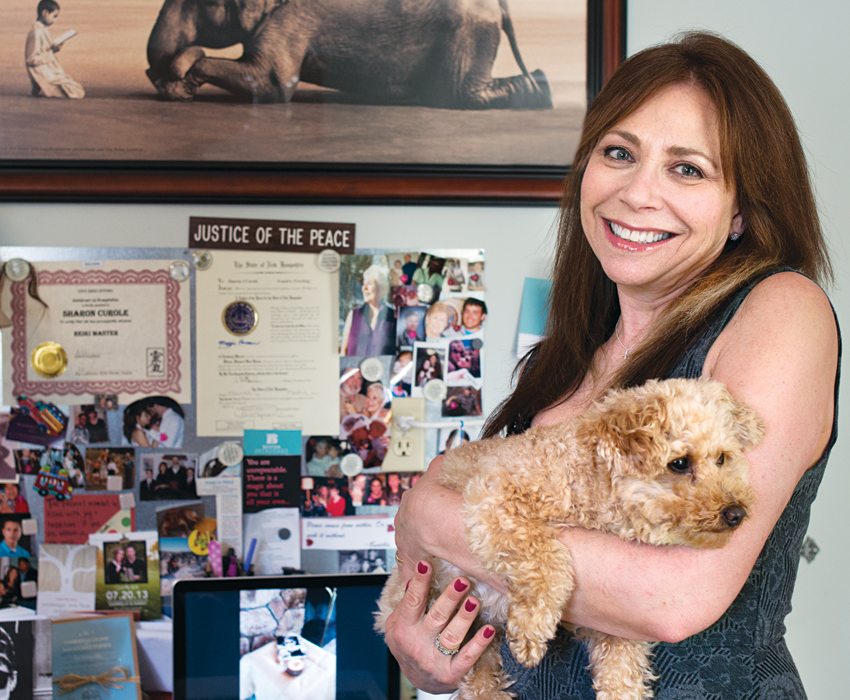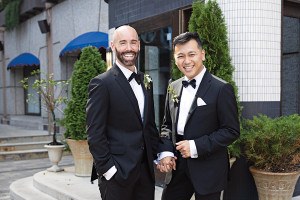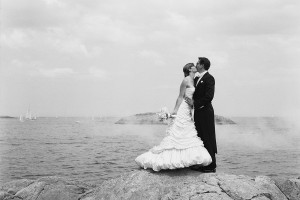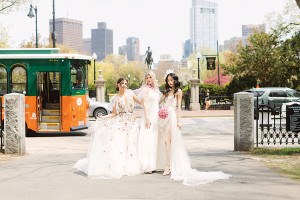The Joiner

Photograph by Rania Matar
Sharon Curole is a born nurturer. For years, she applied this skill to end-of-life care, earning a degree in gerontology and comforting hospice patients on their deathbeds. But when a friend asked Curole to help with her interfaith wedding ceremony, she found a new calling. Within two months of the nuptials, Curole began studying to become a justice of the peace, or a “master of love,” as she describes it. Working with couples at the beginning of their lives together is “incredible,” she says. “Now, I can’t imagine anything else.”
Eleven years, 350 weddings, and countless renewed vows later, Curole has seen it all—arranged marriages, ceremonies without kissing, even a wedding in a couple’s kitchen that was thrown together in an hour—which is why couples fly her all over the country to guide them through tying the knot. Ahead, the Manchester, New Hampshire–based justice of the peace offers advice on creating and personalizing your ceremony.
Describe your first meeting with a bride- and groom-to-be.
My goal is to cultivate a relationship with each couple. We meet in person or over Skype, and I learn as much about them as I can by asking tons of questions: What do you envision your ceremony to be like? Are you religious? Is either of you devoted to one ritual, aspect, or custom? Nine out of 10 times the answer to that last question is no. Because if they were, they wouldn’t be talking to me—they would be talking to a priest or a rabbi.
How do you begin planning a nonreligious ceremony?
We start with a clean slate. We need to find the fiber to fill up their ceremony—because, let’s face it, I can’t do standup comedy for 15 minutes. I’m extraordinarily nonjudgmental. To me, love is love is love. I don’t care if you’re purple or green or striped or the same sex—I don’t care what you are. If you’re in love, and it’s legal for me to marry you, I’m going to do it—but I’m going to make sure that all of your guests feel like I’ve known you forever.
How do you incorporate different religions into one ceremony?
I ask the couple which part of their religious background they want to include. It’s always symbolic—some words or a blessing. My job is to figure out how to express that verbally. I do some research, find something that’s gorgeous, and run it by them. Each person should be comfortable and at peace with the decisions made for the ceremony. It’s easy to incorporate different faiths as long as the couple is forthcoming with their wishes—and I have to be careful not to offend anybody in the audience. If parents are paying for the wedding, it’s nice to include something for them.
How do you counsel couples whose parents really want a religious ceremony?
If a bride and groom have parents who want a religious ceremony, they probably won’t contact a justice of the peace. If they do, however, and would like my input, I will counsel them on how to respectfully and fairly approach parents so that all are happy with the end result. Compromise is the key, and can usually be done without too much trouble.
What kind of couple poses the biggest challenge?
Occasionally I have very technical, scientific people who feel connected only to black-and-white facts, things they can feel and touch. But I never give up. If there’s no specific religion, I ask if they are spiritual. Where is your belief system? Is it in the universe? Is it in trees? Do you feel most connected to the world when you’re at the ocean? Often people are reluctant to answer, because they’ve never thought about these questions. That’s when I have to dig deep. Everyone feels they are connected to something.
Describe a typical ceremony.
The ceremonies that I create are a true, sincere representation of each couple, and I incorporate Reiki into my rites.
What is Reiki, and how does it relate to weddings?
It’s an ancient hands-on healing technique that uses the power of intuition and tension and energy transformation—all coming from a place of love. Nine out of 10 couples are nervous when we meet; Reiki can promote a stress-free environment and teach them how to breathe in peace and balance and exhale stress and anxiety.
What other elements do you include in your ceremonies?
I tell the couple’s love story in my own way. It’s humorous, it’s romantic, it’s intimate, and it’s just very personal. I find some common core values that I can extract from what they tell me. And sometimes, with a couple’s permission, I’ll light a candle for the people they’ve loved and lost.
Have you married anyone in the round?
Yes, there’s something cool about being married while you are surrounded by those you love—either standing or sitting in a circle around you. The best rounds are always outside in a field, a pasture, or a yard.
Have you ever been surprised by a ceremony?
Nothing surprises me. I’ve seen it all. Though, once there was a girl who ripped off her dress after a wedding on the beach and plunged into the ocean.
What’s your favorite part of the job?
I meet the best people. I’m still in touch with most of my couples, and they often have me bless their babies. We become a family.
Sharon Curole, 603-661-4656.
TIPS
Sharon Curole’s go-to readings.
“[I carry your heart with me (I carry it in],” by E. E. Cummings
Best for couples who may, on occasion, be separated by distance.
“Blessing of the Hands”
Best for couples who plan to have children one day.
Apache Wedding Blessing
Best for spiritual couples. It’s alternative and native in essence.
“Honoring the Directions”
Best for nature-loving couples. It’s a way to symbolically invite all of creation to be present and take part in the festivities.
“Love,” by Roy Croft
Best for all couples. It’s straightforward L-O-V-E!
Want more tips and tricks? Learn more from Boston’s wedding experts.
Getting married? Start and end your wedding planning journey with Boston Weddings' guide to the best wedding vendors in the city.


